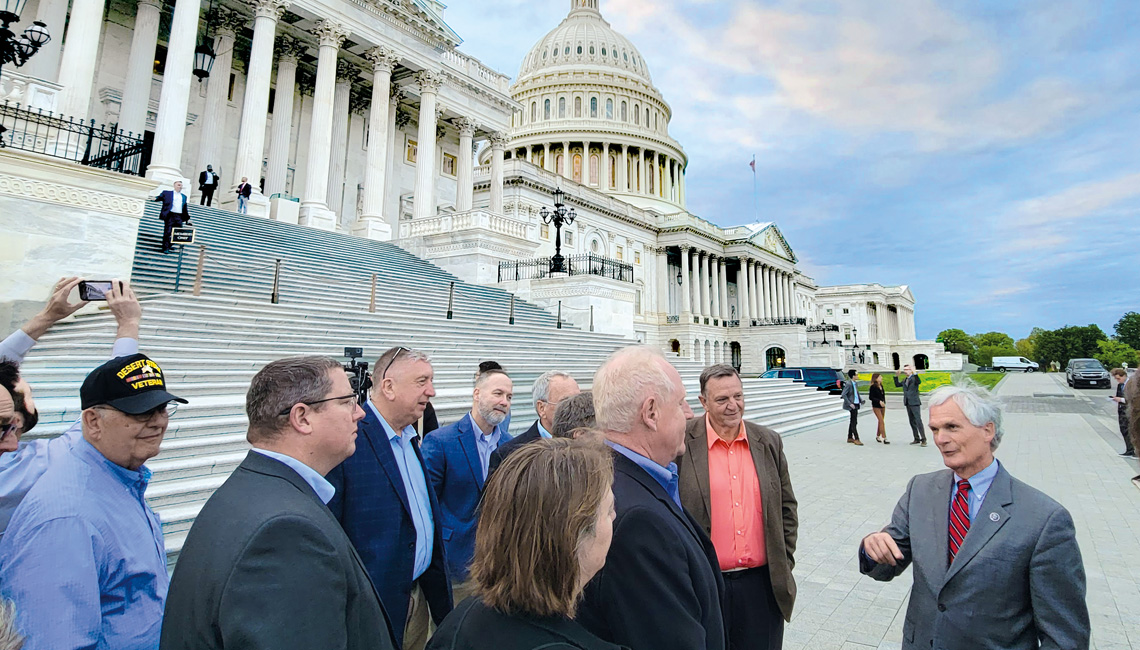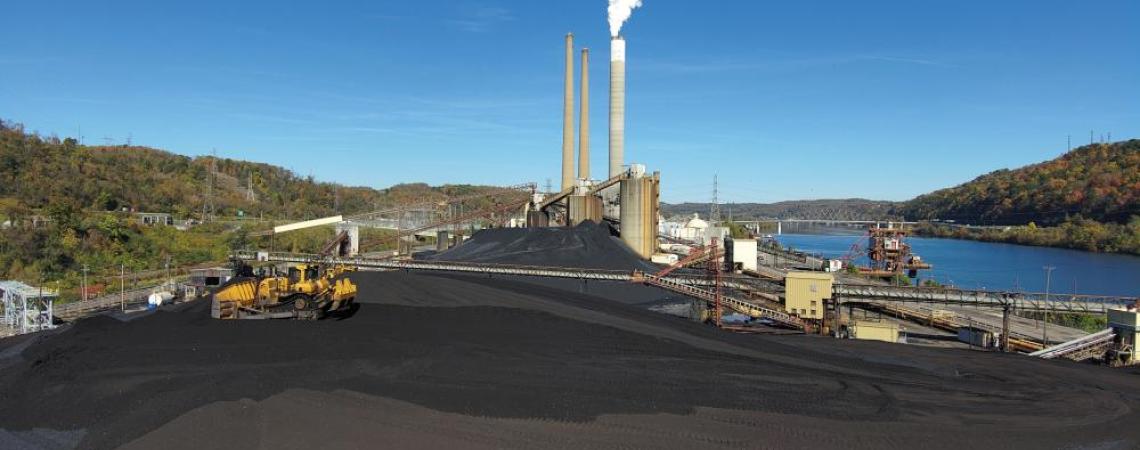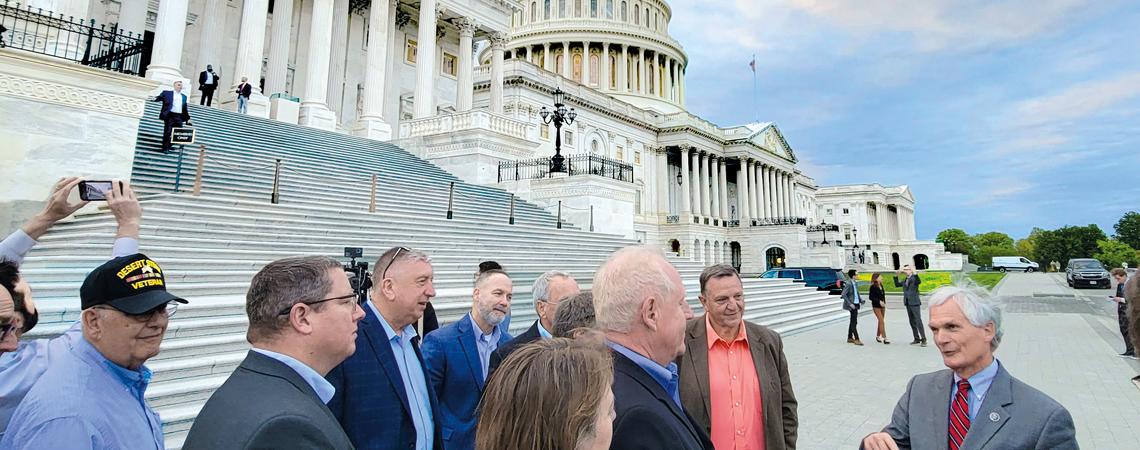Electric cooperatives have a long history of standing up for themselves when the needs of their members are not being met.
A cornerstone of cooperative influence is engaging in the political arena. It’s a necessary and important part of keeping the cooperative business model strong, so co-ops invest a significant amount of time in building relationships with government representatives.
“It’s imperative that the voices of co-op members are heard by decision-makers at every level,” says Marc Armstrong, director of government affairs for Ohio’s Electric Cooperatives, the statewide trade association that provides services to the state’s cooperatives. “We try to make sure government officials know how their decisions will affect people’s everyday lives, and it’s really as simple as that.
Development such as the Intel manufacturing facility in Licking County is driving increasing demand for electricity, adding renewed importance to reliable coal-fired generation such as that provided by the Cardinal Plant in Brilliant.
Hosting elected officials at the co-ops’ Central Ohio Lineworker Training Facility in Mount Gilead or the Mone power plant in Convoy gives co-ops a chance to highlight the cooperative difference — to show firsthand how locally owned, not-for-profit co-ops do more with less every day to serve their members.
Co-op managers and trustees also meet those leaders on their own turf, traveling to the Ohio Statehouse or to Washington, D.C., to share a united constituent voice.
The relationships co-op leaders are able to build, whether with a local township trustee, a state representative, or a U.S. senator, allow them to speak to those officials from a position of trust.
Mike Aquillo, CXO/VP member services for Marysville-based URE–Union Rural Electric Cooperative, joined other co-op leaders for the National Rural Electric Cooperative Association’s Legislative Conference in Washington, D.C., in April. “This was a great opportunity for cooperatives across the country to come together and discuss the energy policy issues impacting our members,” Aquillo says. “The Ohio cooperatives showed up in force, had very productive meetings with our elected officials, and clearly communicated our concerns, specifically with the declining thermal baseload generation and its potential serious impacts on the reliability that our members — their constituents — know and depend on.”
That topic is increasingly on the minds of co-op leaders as they examine new rules proposed by the U.S. Environmental Protection Agency (EPA) that, while well-intentioned, would have a devastating effect on power companies’ ability to provide reliable, 24/7 electricity. The efforts that have followed the announcement of these regulations illustrate the formidable voice co-ops can project when united on an issue.
Co-ops, through their statewide and national trade associations, have banded together to make sure that both federal legislators and the EPA understand the implications of the proposed rules.
These efforts to advocate for responsible energy policy are crucial, says Pat O’Loughlin, president and CEO of Buckeye Power, the cooperative that supplies the electricity that Ohio co-ops deliver to their members.
“People of all political persuasions depend on a reliable supply of electricity for their health, safety, and security,” O’Loughlin says. “These rules, in effect, will force us to shut down the power plants that are the most reliable and affordable sources of power that exist today.”
The rules aim to slash carbon dioxide and other power plant emissions and include a requirement that coal and natural gas power plants capture nearly all the carbon dioxide they create, or else be forced to close.
Co-ops understand the importance of reducing greenhouse gases, O’Loughlin says, but the problem with the proposed rules is that neither the technology nor the infrastructure currently exists to allow coal and gas plants to comply — and it would take years just for zoning and engineering requirements to be put in place, even if they did.
“If compliance were even possible, the cost would be far greater than the EPA suggests and would far outweigh any environmental benefits,” Armstrong says. “That’s what our legislators need to know.”
The cost of the rule, co-ops contend, isn’t just monetary. Those coal-fired and gas-fired power plants are closing with nothing in place to meet power demands when the sun is not shining or when wind turbines aren’t moving — both of which happen during extreme weather, when electricity is in greatest demand.
“While renewable energy technology has improved in recent years, intermittent generation resources cannot meet the growing demand on their own,” O’Loughlin says.
For example, The Energy Cooperative in Newark, thanks to growth in western Licking County and Intel’s decision to locate in nearby New Albany, projects it will add 9,000 new electric members over the next five to 10 years, leading to an increase of 50% to 90% compared to its current demand.
“The increased load includes data centers and commercial-industrial members that operate around the clock,” says Josh Filler, VP and COO–electric operations at The Energy Cooperative. “The more baseload generation we lose, coupled with increased demand for energy, the more susceptible we will be to rolling brownouts, or worse yet, blackouts. Our members depend on us to maintain reliable and consistent service.”
And that’s why the co-ops are speaking out in unison against the proposed rules — once again standing up for their members, who will be the ones who pay the price in both higher electric bills and increased potential for blackouts.
What can YOU do?
As a cooperative member, you can help make sure elected officials know how you might be affected by various laws and rules that are up for debate at various levels of government by joining Voices for Cooperative Power.
VCP is a grassroots educational and advocacy program designed to both keep members aware of the concerns of co-ops and to help members directly communicate those concerns to elected officials.
Visit www.voicesforcooperativepower.com to get updates on the latest issues of importance to the co-op and to find easy ways to communicate with government officials.
Members also may check out America’s Electric Cooperatives PAC, a political action group that builds relationships with candidates for federal office so that when issues arise that affect co-ops, those candidates, if elected, are most likely to support positions that benefit cooperative members. For more information about the PAC and how you can join, contact your cooperative.












